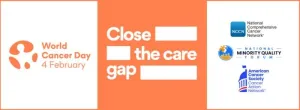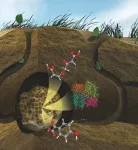According to the resolution, the United States Congress designates February 4th as World Cancer Day to highlight the importance of taking meaningful action to raise awareness of the disparities that exist in cancer care, and support efforts to close the care gap. Despite progress in recent years, Black Americans have the highest death rate and lowest survival rate of any racial or ethnic group for most cancers.[1] Compared to White people, mortality rates are two‐fold higher for prostate, stomach, and uterine corpus cancers in Black people and for liver, stomach, and kidney cancers in Native American people.[2]
World Cancer Day is a global awareness day organized by the Union of International Cancer Control (UICC) every February 4th. The 2024 observance marks the third and final year for the ‘Close the Care Gap’ campaign focused on reducing disparities in cancer treatment and outcomes.
The ACCE will continue to identify governmental actions to drive further improvements in the three areas of focus and advance necessary structural changes to cancer care delivery throughout the U.S. They call on members of Congress to support:
H.R.1826/S.2821 - PSA Screening for HIM Act H.R.4286 - Increasing Access to Lung Cancer Screening Act H.R.4363/S.2213 - Comprehensive Cancer Survivorship Act “We must ensure that every person with cancer—regardless of race/ethnicity, geographic location, or other societal factors—has equal access to life-saving early detection, treatment, and support,” said Crystal S. Denlinger, MD, Chief Executive Officer, NCCN. “Improving diversity in clinical trials is fundamental to advance cancer care. It will help us fill knowledge gaps—such as how effective various innovations are for people with different backgrounds—and ensure that every patient is being informed of all their treatment options. We also know that disparities in access to screening lead to later stage at diagnosis, resulting in unequal outcomes and reduced longevity in marginalized populations. Patient navigation can address some of the existing imbalances, and we applaud recent progress to make that more accessible to the people who need it. We commend Congress for their World Cancer Day resolution, and call on lawmakers, public and private payers, federal agencies, and local policymakers to continue this important work to help close the care gap.”
“Everyone should have a fair and just opportunity to live a longer, healthier life free from cancer regardless of how much money they make, the color of their skin, their sexual orientation, their gender identity, their disability status, or where they live,” said Lisa A. Lacasse, President, ACS CAN. “Increasing diverse representation in clinical trials, improving access to cancer screening and prevention services and ensuring patient navigation services are accessible to all who are diagnosed with cancer are critical to reducing the cancer burden for everyone. We urge lawmakers to help close the cancer care gap by supporting these policies.”
"We are at a real crossroads regarding the provisioning of cancer care in America," said Gary A. Puckrein, National Minority Quality Forum President and CEO. "The profound lack of access to early detection and intervention, coupled with a scarcity of robust healthcare infrastructure, exacerbates disparities and propagates a tiered healthcare system, which has permitted medically underserved cancer care communities. While we are encouraged by growing acknowledgement of these issues, NMQF urges lawmakers that the time is now to prioritize the needs of marginalized communities to collectively close the gap in cancer care.”
The ACCE grew out of the joint Elevating Cancer Equity initiative, first launched by NCCN, ACS CAN, and NMQF in 2021. At the time, a working group identified 16 actionable policy changes to address structural inequities in care. Since then, the group has worked with policymakers, regulators, and administrators, to achieve several of those goals. Those successes include legislation directing the Food and Drug Administration (FDA) to release guidance on decentralized clinical trials, the inclusion of reimbursement for patient navigation services from the Centers for Medicare & Medicaid Services (CMS), and several state-level initiatives policies to increase access to lung cancer screening.
Visit NCCN.org/wcd to learn more about World Cancer Day and the ACCE’s efforts.
# # #
About the National Comprehensive Cancer Network
The National Comprehensive Cancer Network® (NCCN®) is a not-for-profit alliance of leading cancer centers devoted to patient care, research, and education. NCCN is dedicated to improving and facilitating quality, effective, equitable, and accessible cancer care so all patients can live better lives. The NCCN Clinical Practice Guidelines in Oncology (NCCN Guidelines®) provide transparent, evidence-based, expert consensus recommendations for cancer treatment, prevention, and supportive services; they are the recognized standard for clinical direction and policy in cancer management and the most thorough and frequently-updated clinical practice guidelines available in any area of medicine. The NCCN Guidelines for Patients® provide expert cancer treatment information to inform and empower patients and caregivers, through support from the NCCN Foundation®. NCCN also advances continuing education, global initiatives, policy, and research collaboration and publication in oncology. Visit NCCN.org for more information.
About ACS CAN
The American Cancer Society Cancer Action Network (ACS CAN) advocates for evidence-based public policies to reduce the cancer burden for everyone. We engage our volunteers across the country to make their voices heard by policymakers at every level of government. We believe everyone should have a fair and just opportunity to prevent, detect, treat, and survive cancer. Since 2001, as the American Cancer Society’s nonprofit, nonpartisan advocacy affiliate, ACS CAN has successfully advocated for billions of dollars in cancer research funding, expanded access to quality affordable health care, and advanced proven tobacco control measures. We stand with our volunteers, working to make cancer a top priority for policymakers in cities, states and our nation’s capital. Join the fight by visiting www.fightcancer.org.
About National Minority Quality Forum
The National Minority Quality Forum (NMQF) is a 501(c)(3) not-for-profit research and advocacy organization based in Washington, DC. The mission of NMQF is to reduce patient risk by assuring optimal care for all. NMQF’s vision is an American health services research, delivery and financing system whose operating principle is to reduce patient risk for amenable morbidity and mortality while improving quality of life. NMQF leads the Cancer Stage Shifting Initiative which is aligned with the White House Cancer Moonshot program to move us from late-stage to early-stage diagnosis and treatment of cancer, improving cancer care and reducing cancer deaths for all, with a particular focus on equity and underrepresented populations. For more information, please visit https://www.nmqf.org/.
[1] DeSantis, C.E., Miller, K.D., Goding Sauer, A., Jemal, A. and Siegel, R.L. (2019), Cancer statistics for African Americans, 2019. CA A Cancer J Clin, 69: 211-233. doi:10.3322/caac.21555
[2] American Cancer Society. Cancer Facts & Figures 2024. Atlanta: American Cancer Society; 2024.
END





